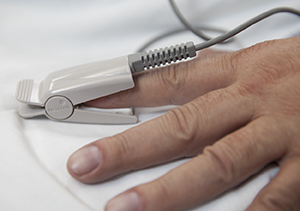Exercising with Chronic Lung Disease: Taking the First Step
Exercise has helped thousands of people with chronic lung disease gain more control over their lives. It can help you, too! You’ll get started in pulmonary rehab (rehabilitation). The pulmonary rehab team will help you set safe, realistic goals. To have lasting results, exercise has to be a lifelong commitment. This means you must keep doing it even after your pulmonary rehab program has ended.
Assessing your needs
Before you start exercising, the pulmonary rehab team will assess your needs. You will be asked about your health history and symptoms. If you have joint pain or any other health problems, be sure to discuss them with the team. This lets the pulmonary rehab team make sure you are safe and comfortable during exercise.
How far can you go?
The pulmonary rehab team needs to know how much you can safely do right now. To find out, you may have a 6-minute timed-distance walk test. This is not a race. For this test, you will walk on a flat surface, such as a hallway or short track. The test shows how far you can walk in 6 minutes and what symptoms happen. A team member will ask about your shortness of breath and if you are in any pain. Your heart rate and oxygen levels will be checked, too. During the test, you can stop and rest if you need to. Once you catch your breath, keep going.
Your oxygen levels
A pulse oximeter is a small tool that measures the oxygen in your blood. It’s attached to a small probe that slips over your finger. The oxygen in your blood will be measured before, during, and after your walk test. This shows if oxygen needs to be prescribed. You may need oxygen during exercise even if you don’t use it at other times. If you already use oxygen, you may need a different flow rate during exercise.

An exercise program just for you
You’ll follow an exercise program that’s been specially designed for people with chronic lung disease. This program will be tailored to your own needs. In other words, it’s an exercise program just for you. And you’ll have support every step of the way.
-
Starting out. Your healthcare team will help you get started slowly and safely. With each exercise session, you’ll do a little more than you did the time before.
-
In the long run. You’ll probably work up to moderate exercise of about 20 to 30 minutes of exercise 3 to 4 days a week. You’ll likely be exercising at the pulmonary rehab facility as well as at home.
Reaching your goals
Exercise will be most rewarding if you’re working toward a goal. Sometimes it helps to break up big goals into smaller ones. Say your long-term goal is to play a round of golf. You could start with a smaller goal of hitting a bucket of balls. When you’ve mastered that goal, you could move on to playing a few holes. Each time you meet a smaller goal, you’re a step closer to meeting the big one.
What’s stopping me?
It’s easy to think of reasons why exercise is hard. Try to face your fears and excuses head-on. What’s stopping you from exercising? Write down anything that comes to mind. For each, try to think of at least 2 possible solutions.
What’s stopping me? _________________________________________________
Possible solutions: _____________________________________________________
What’s stopping me? _________________________________________________
Possible solutions: _____________________________________________________